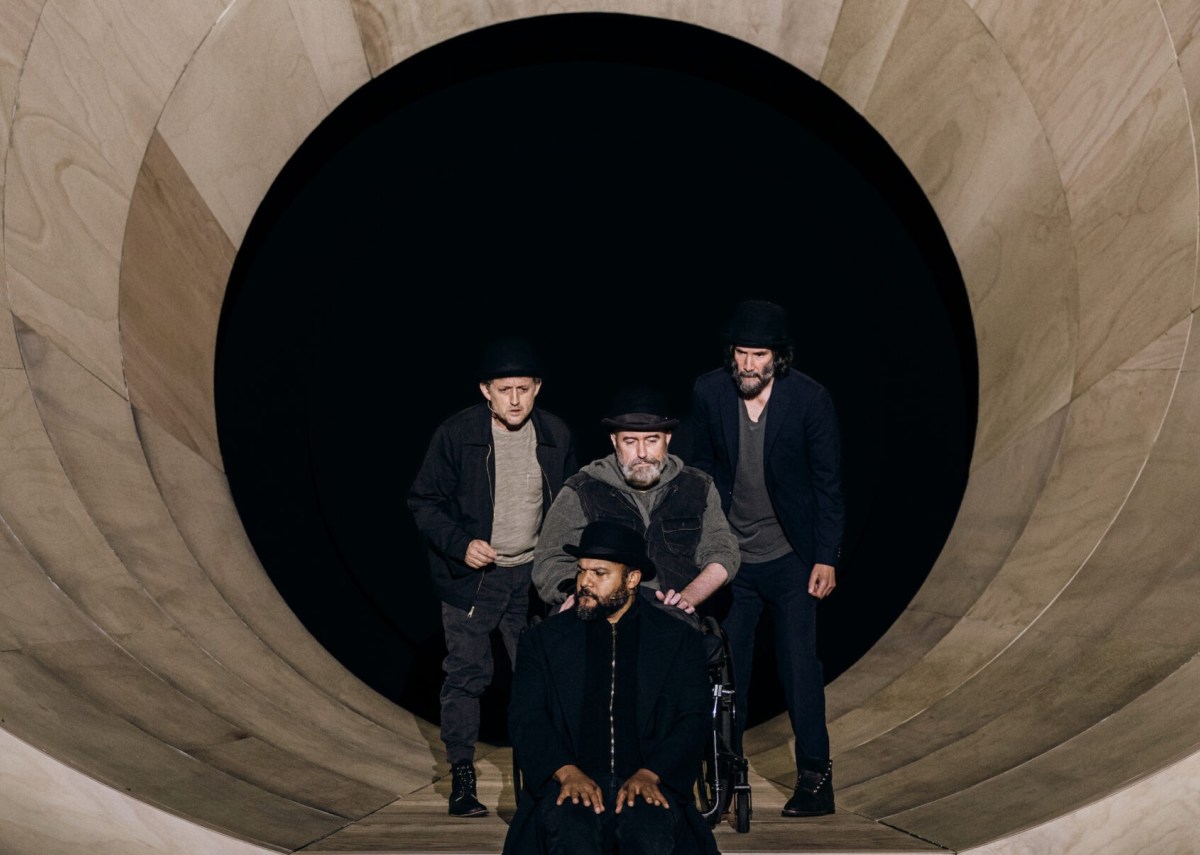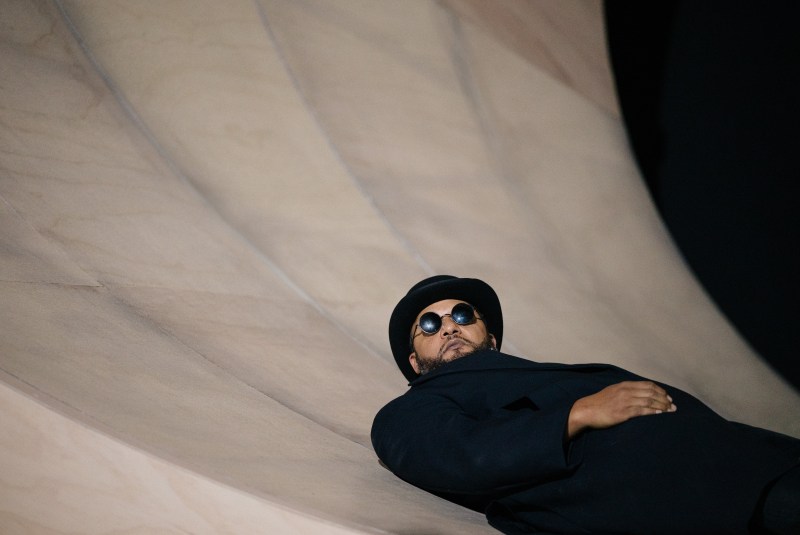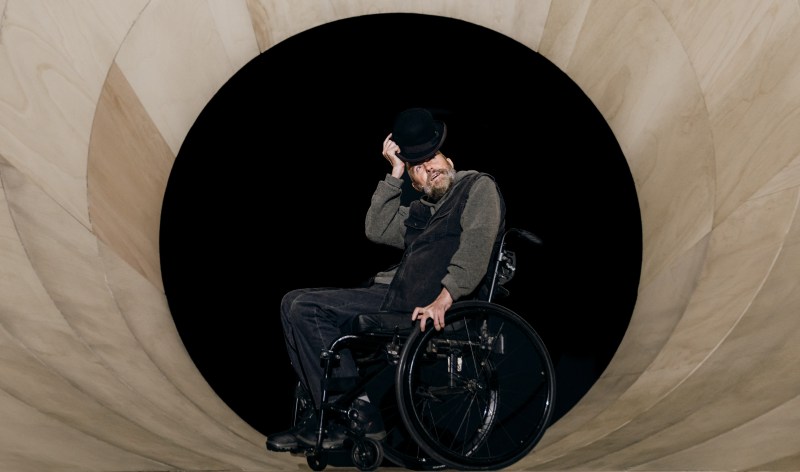
Alex Winter, Michael Patrick Thornton, Brandon J. Dirden, and Keanu Reeves in a scene from Waiting for Godot. (Photo: Andy Henderson)
When two actors describe Samuel Beckett’s work as both a “pleasurable torture” and a “terrifyingly high-stakes assignment,” you know you’re in for a ride.
In Jamie Lloyd’s stark-but-not-stark production of Waiting for Godot, now playing at Broadway’s Hudson Theatre, Brandon J. Dirden (Pozzo) and Michael Patrick Thornton (Lucky) dive headfirst into the “pleasure and torture” of Beckett’s world.
reedom and precision wrestle, co-dependency becomes a survival tactic, and even the pronunciation of “Godot” becomes a journey of its own (yes, it’s correctly pronounced God-oh).
Dirden (All the Way) and Thornton (A Doll’s House) are as radiant, off-kilter, and exacting as Godot itself.
Fresh off of discovering that Beckett can hold everything from jazz-like improvisation to metaphorical “DeLorean garbage,” the pair sat down with The New York Independent to talk about the vortex of the set’s tunnel, the odd comforts of asymmetrical relationships, and what it takes to conjure a decades-long bond with scene partners they met only months ago.
The New York Independent: For many actors, Beckett is a rite of passage. What was your familiarity with his work prior to this production?
Michael Patrick Thornton: I was a big dork in high school and college and read a ton of Irish literature. I was certainly familiar with his novels and plays but had never performed his work. The only formal instruction I had with Beckett was at Steppenwolf, where they used to have an amazing 10-week intensive training program. [Actor] Frank Galati taught a class on Beckett. He had this infectious enthusiasm and he was my gateway drug into Beckett as a performer. But I had never had the pleasurable torture of performing it until now.

Brandon J. Dirden is caught in a vortex of his own imagination in ‘Waiting for Godot.’ (Photo: Andy Henderson)
NYI: How has the play been a pleasurable torture?
Thornton: [Brandon and I] have worked with titans of playwrights, but I have never had an experience where it demands simultaneous freedom and a kind of riffing from a place of an unconscious jazz performance. At the same time, I must stay completely intent on the text and where one is at, or else you just get decimated and you’re lost inside the cyclone. Beckett is an interesting writer because he demands simultaneous attention and freedom. If I couldn’t juggle those two balls, I would get into a bit of trouble.
Brandon J. Dirden: I echo that. This is my first go at Beckett as well. I’ve been a longtime admirer and I have seen a few productions of Godot over the years. I will admit when I was trying to read it on my own in school, I never made it all the way through the entire thing in one sitting. I would skip around. But seeing it performed live is a completely different experience.
It is torturous, but is so pleasurable. It asks so much of you! It says, ‘Hey give me everything you’ve got. Whatever you can muster up, give it to me. I can use that.’ It’s like when Doc comes back in the DeLorean at the end of ‘Back to the Future,’ and he’s putting all of the garbage into the Mister Fusion reactor. With Beckett, whatever you think is crap, put in there and it will be useful. It wants you not to be precious, and at the same time the text wants you to be absolutely exacting. But only for that one time. It doesn’t want you to do the same thing the next time.
NYI: How did the starkness of Jamie Lloyd’s production contribute to the meaning of the production for you?
Dirden: I think a function of the play is that it’s totally up to the beholder. I truly believe you are having a unique experience when you watch a Beckett play. I don’t feel the starkness when I’m doing it. It feels absolutely luminous. What you’re receiving with the interactions between the characters doesn’t feel stark to me.
Thornton: We’ll watch on the monitor backstage sometimes before we go out for the curtain call, and there’s this weird effect on the TV screen because at one moment the tunnel [set] seems to be concaved, and then in another moment convexed. It is pretty vertiginous to watch this. I don’t know if that’s the same experience in the seats. From my perspective inside the [onstage] tunnel, it feels like the set does a good job of telescoping whatever I’m feeling out into the audience.
NYI: Did you find that Pozzo and Lucky’s relationship shaped the play, or was the play shaped around their relationship? How impactful was their relationship on the rest of the production?
Dirden: I just try and figure out to the best of my ability everyday why I need to be with Lucky. what’s keeping me with him, and why I need to be with these other two guys. One thing that Michael and I are on the same page about is the codependency of these two. Lucky thinks he’s taking care of Pozzo, and Pozzo thinks he is taking care of Lucky.
In a way, they’re both right, and in a way they’re both wrong. It’s not necessarily a healthy relationship, but it’s one that is full of love, as well as a lot of spite, resentment, and affection. I just love that we aren’t afraid of exploring these seemingly polar opposites of what’s possible with this relationship. The easy choice is that hierarchal power shift, that Pozzo is clearly the master and Lucky is clearly the slave. I don’t think that’s interesting enough. I was quite thankful to Jamie and Michael because we had a curiosity for what is beyond the typical master/slave relationship.

Michael Patrick Thornton plays ‘Lucky’ in Jamie Lloyd’s stark-but-not-stark production of ‘Waiting for Godot.’ (Photo: Andy Henderson)
Thornton: Static, asymmetric power dynamics aren’t very interesting to play. I would echo that love really is the bedrock to their relationship, and the comedy and tragedy in them each presuming they are each other’s caretakers is wonderful. I think Lucky is coming from a place of, “whatever you need me to be today to make your day be less agitated, I will do it.” Whatever it takes to grease the tracks to have a good day inside this hellish landscape is sort of what he’s predisposed to.
NYI: Did you attempt to create a backstory for your characters?
Dirden: As much as it’s useful to make it make sense in the moment. I have to square that as an actor. Why am I still with this guy? It’s more of what is my truth and my need for this person. I am more interested in what makes sense to me in terms of the need for another human being. I think that’s at the core of this play. Why are Didi (Alex Winter) and Gogo (Keanu Reeves) still together after 40, 50 years? What is the need they have for each other? I do that, in terms of my relationship with Lucky.
Thornton: It has taken some real lateral and unconscious thinking, and dream and journal work, and then simply seeing how Brandon and our energy connects and shifts. We didn’t know each other before this. It’s a hell of an assignment to create a lifelong friendship on stage after being strangers only a few months ago. This is a play very much about loneliness, codependency, and survivors. I think we just got to a really great creative shorthand fast.
Dirden: It’s also unfair to hold another actor accountable for my imaginations. If I create a back story that involves Michael’s Lucky, that takes away a lot of agency from Michael. I’m expecting him to fit into my imagined narrative that he’s not privy to. I tried not to saddle him with my homework. It’s always more interesting to see what we come up together [than alone].
NYI: The show is so much about your relationship and how you’re bonded. To add an extra challenge, you’re sharing the stage with two people who are infamous for their longstanding friendship. What were you most surprised to learn through working with Keanu and Alex? How did their relationship inform the relationship you both had on stage?
Thornton: I assumed that they wouldn’t sign up for an endeavor like this if they weren’t serious about it. I don’t think I was prepared to see how hard-working they actually were in rehearsal. They would literally and metaphorically beat themselves up to figure out the truth of the moment. They were preparing for years before the first day of rehearsal.
They took clown classes, met with a Beckett biographer, and went to the archives. They did their homework in a way that floored me. As an actor you have to understand that you can’t compete with forty years of friendship. That’s going to be its own pulsing thing, and whatever Brandon and I come up with on our own is going to be in a different key. As long as we’re working as a good quartet, it’s going to make beautiful music.
Dirden: Both Michael and I have experience working with high profile celebrities in theatre. Most recently I worked with Bryan Cranston in All the Way, and he had a theatre background as well. Jessica Chastain worked with Michael in A Doll’s House, and she has a theatre background too. These people have had sustained careers over decades, and that’s not by accident. It’s because you will be exposed in the theatre if you aren’t serious about it.
I had every expectation that Keanu and Alex have been able to sustain the level of artistry that they have, even if it’s away from the theatre, for so many years. I told them this in the second week of rehearsal: “I’m quite impressed. You guys gave yourselves every opportunity to succeed at this endeavor.” They made so much space for Michael and I too. Maybe it’s silly to give them credit for just doing their jobs, but there are so many distractions and reasons why they would not be able to do that job. Part of the preparation you see with Keanu is making choices to stay human and grounded. Some people are inaccessible with collaboration; that is not the case here.
NYI: What do you hope audiences come away feeling after Godot?
Thornton: Don’t wait too long for your life to start, because before you know it, it will be over. Beckett gets a pretty dour vibe, but the more I work on him, the more I find him like a gallows humor life coach. It’s a miracle that we’re here; why not seize the opportunity? I hope people feel less alone, that they count their blessings, and realize how extraordinary it is in life to even be able to have one true friend.
Dirden: I would be so happy if someone watched this play and went away and said, ‘You know what? I’ve got to lock in that road trip that me and my best friend have been talking about for twenty years.’ And they go and book the tickets and make the plans. There’s so many plays or movies about birth families. But with this play, to be around these chosen people and relationships, turns the focus and attention to those people we have chosen to be with. Those relationships are so fortifying, important, and necessary to our identity and our happiness quotient.
Tickets for Waiting for Godot, which will play through Sunday, January 4, 2026 only are on sale now at www.godotbroadway.com.


